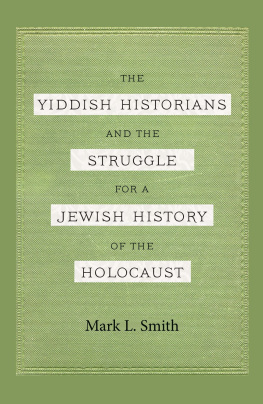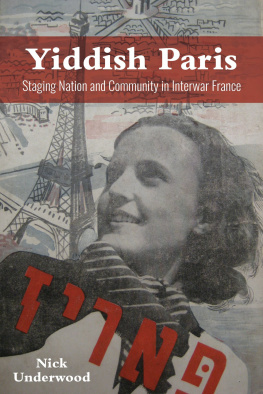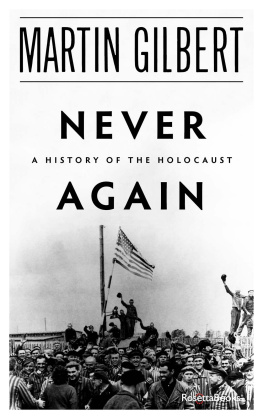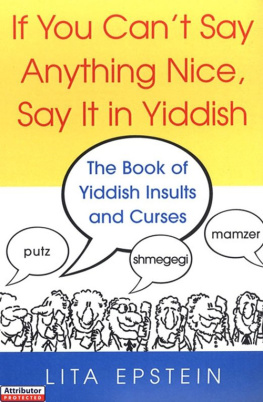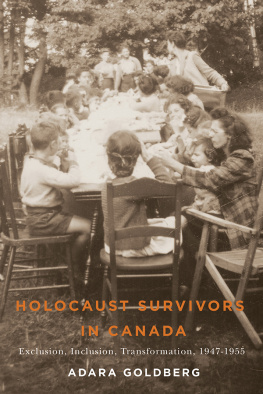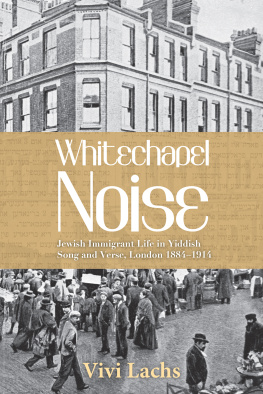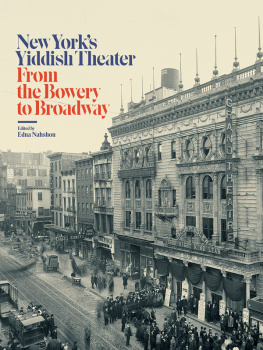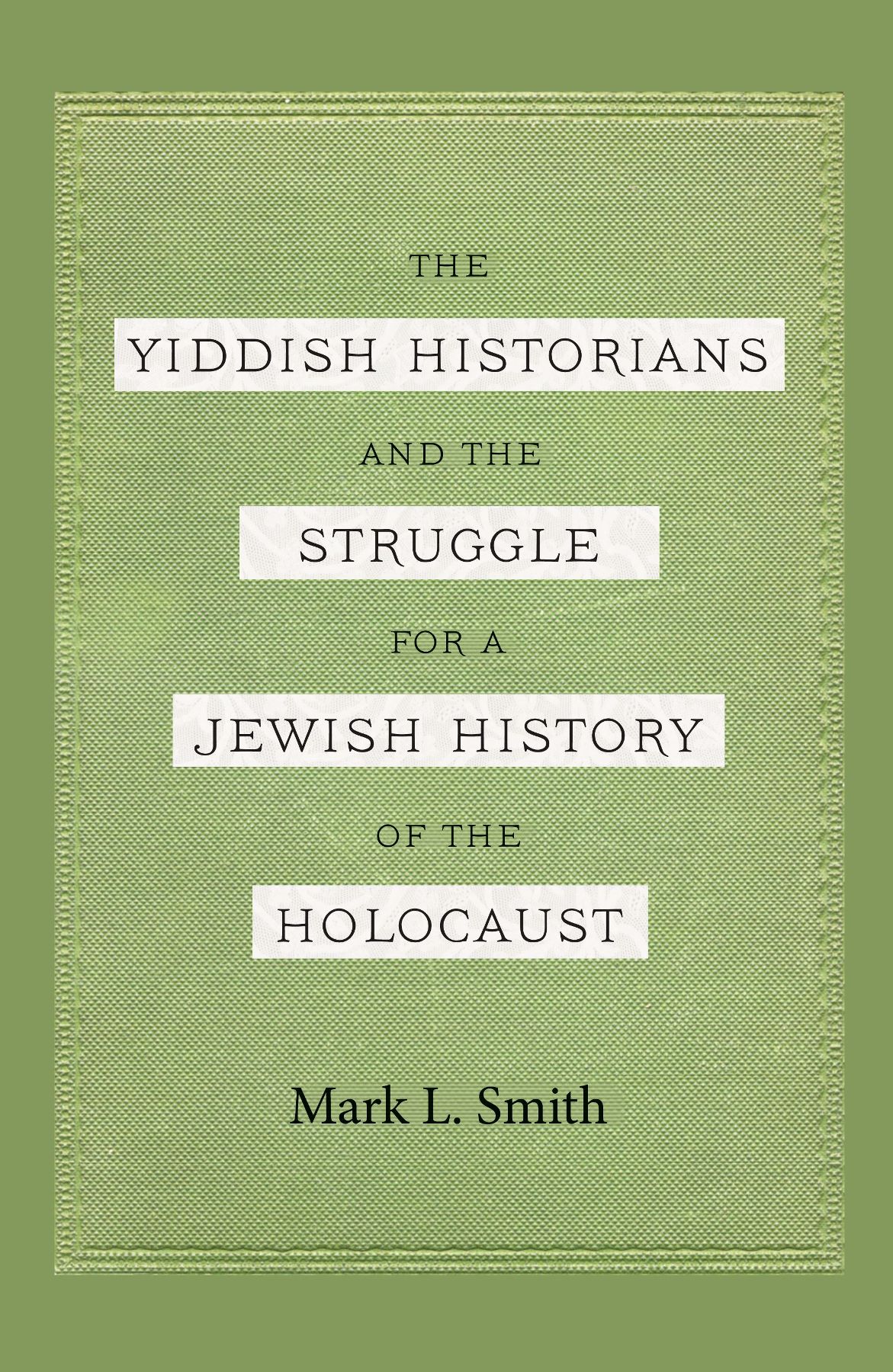
The
Yiddish Historians
and the
Struggle
for a
Jewish History
of the
Holocaust
The
Yiddish Historians
and the
Struggle
for a
Jewish History
of the
Holocaust
Mark L. Smith

Wayne State University Press
Detroit
Copyright 2019 by Mark L. Smith. Published by Wayne State University Press, Detroit, Michigan 48201. All rights reserved. No part of this book may be reproduced without formal permission.
ISBN 978-0-8143-4612-9 (hardcover); ISBN 978-0-8143-4613-6 (e-book)
Library of Congress Control Number: 2019945981
Wayne State University Press
Leonard N. Simons Building
4809 Woodward Avenue
Detroit, Michigan 48201-1309
Visit us online at wsupress.wayne.edu
Contents
All translations and transliterations are my own. In general, I have followed the standards of the YIVO Institute for Jewish Research in transliterating Yiddish. The few exceptions include well-known terms and names such as yizkor (rather than yisker) and Sholem Aleichem (rather than Sholem Aleykhem).
For the names of persons, I have taken the dual approach of using the conventional English spelling in the text and the transliterated Yiddish or Hebrew spelling in the footnotes and bibliography. Thus, Rachel Auerbach appears in the discussion, and Rokhl Oyerbakh appears in the footnotes and bibliography.
For well-known Polish cities, I have used their common English names (Warsaw, Lodz, and Krakow), and for others, their correct Polish spellings.
The titles of foreign-language books and articles are translated into English in the bibliography (but not in the footnotes).
I have used the anachronistic term Holocaust throughout, although it was used by the Yiddish historians only in their very latest works and would have been foreign to all but the longest lived. Their customary Yiddish terms for the Holocaust were katastrofe or khurbn (from the Hebrew hurban, destruction, which traditionally refers to the destruction of the First and Second Temples in Jerusalem), and, when writing in English, the Destruction or Catastrophe of European Jewry. Their works in Hebrew use either hurban or the more modern Israeli Hebrew Shoah (catastrophe).
A number of online sources are cited in the footnotes and bibliography. Instead of listing a last accessed date for each source, all online sources have been re-accessed and verified as of February 6, 2019.
The work that is placed before the readerto use a favored expression of Yiddish writershad its origin in a rupture of Jewish cultural continuity that occurred at the end of the twentieth century. The first stirrings of this research came at a time when the last remaining Yiddish books were disappearing from the shelves of larger urban bookstores, when public libraries were replacing their Yiddish holdings with the literatures of more recent immigrants, and shortly before Yiddish books would become the first national literature widely available online. During this brief interval, the aspiring reader of Yiddish faced a future seemingly without ready access to the printed Yiddish word.
The writer of these linesto quote another phrase much used by Yiddish authorsresolved to resist this rupture by collecting widely, then following the age-old advice to read widelyand doing so in Yiddish. At the personal level, I also resolved to reverse the process described by Jeffrey Shandler in which the symbolic value of the Yiddish language has often come to outweigh its value as a vehicle for communicating information, opinions, feelings, ideas in the era of postvernacular Yiddish.
Reading widely led me from the classical authors to writers of prose and poetry generally, to literary history and linguistics, theater and humor, the rabbis and rebbes, and to the repository of them all, history. The voices that spoke most directly to me were those of the twentieth-century historians who chose to write Jewish history in Yiddish. In their much-neglected works, I had the privilege of reading the urtext before the commentary: Ginsburg and Zinberg testing the possibility of writing Jewish historical scholarship in the language of the people; Schiper switching languages in mid-career; Ringelblum and Mahler pulling strongly to the leftand campaigning for Yiddish among a new generation of historians; Friedman holding to the centerbut also in Yiddish; the Polish group drawing inward, with Tcherikower reaching for a pan-Ashkenazi history in Yiddish; Shatzky, the Yiddish Columbus, adding the New World to the territory of Yiddish scholarship; and thensuddenlyfewer voices, in more urgent discourse.
Discovering these historians through the portal of their Yiddish writings provided a specific and coherent perspective. Themes that would animate the present work soon became apparent. Two of these relate to process: that a group of historians chose to turn from other languages to their shared ancestral language; and that they conducted a public discourse intended for an educated lay readership. And two themes relate to content: that their focus was on the internal history of the Jews (rather than the history of Jewish rights and disabilities or antisemitism); and that they were engaged in an anti-lachrymose approach to medieval and other periods of Jewish history well before it was advocated by Salo Baron (who might have joined their ranks had he followed the path of his fellow historians from the Austro-Hungarian province of Galicia).
In the first years of the twenty-first century, the commentary was yet to emerge. Avrom Novershtern could call forth in conversation the few works touching on these historiansall first-person accounts destined to become primary sources but without a secondary literature. John Efron encouragingly confirmed to me that these historians have not found their historian. The first scholars of the new century to focus on these figures (if not on the Yiddish aspect of their works) had yet to commence publishing.
One of the first scholarly works to touch on the Yiddish school of historiography was the pathbreaking book by David Myers on the emergence of Jewish historical practice in Israel. Discussing the fateful divergence of institutional Jewish scholarship that occurred in 1925 with the founding of the Hebrew University and of the Yiddish Scientific Institute, he chose (to my relief) to trace the path that led to the Jerusalem School rather than to Vilna. With gratitude, I acknowledge his welcoming an other-than-customary graduate student into the UCLA Department of Historyand I acknowledge my good fortune in having the opportunity to pursue my intended topic with the benefit of his specialization in the study of Jewish historiography and his insights into historical writing in general.
As the focus of this work shifted from the more obvious bright lights of Yiddish historical work in the interwar period to its final sparks in the postwar period (partly at the urging of Samuel Kassow, who had recently completed his comprehensive study of Emanuel Ringelblum), the focus also turned to Holocaust historiography. A fortunate consequence was that my work was drawn into the specialty of Saul Friedlnder, the inaugural holder of UCLAs 1939 Club Chair in Holocaust Studies, to whom I am indebted for much wise counselboth regarding approaches to Holocaust study and his encouragement of my own research.
Next page
